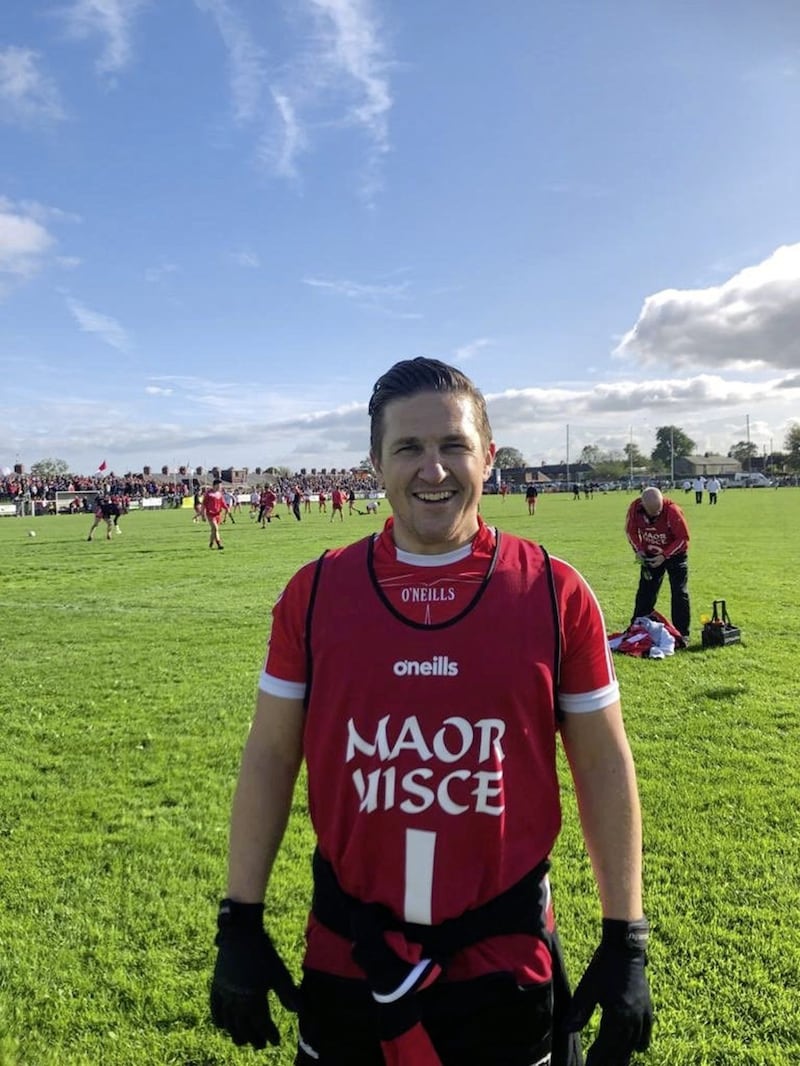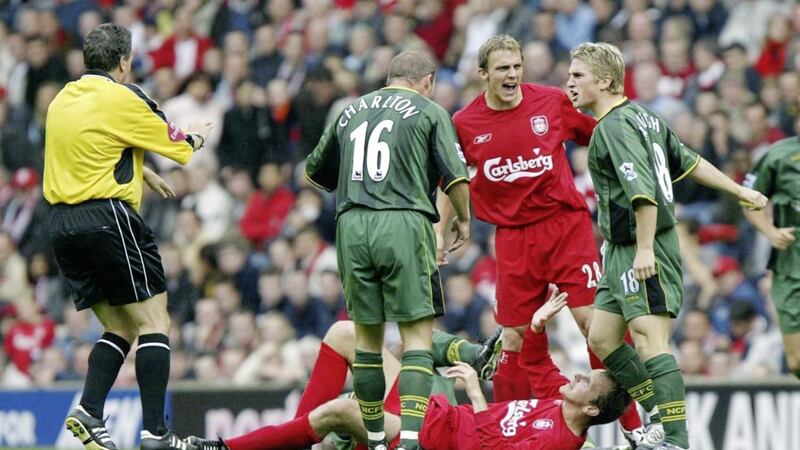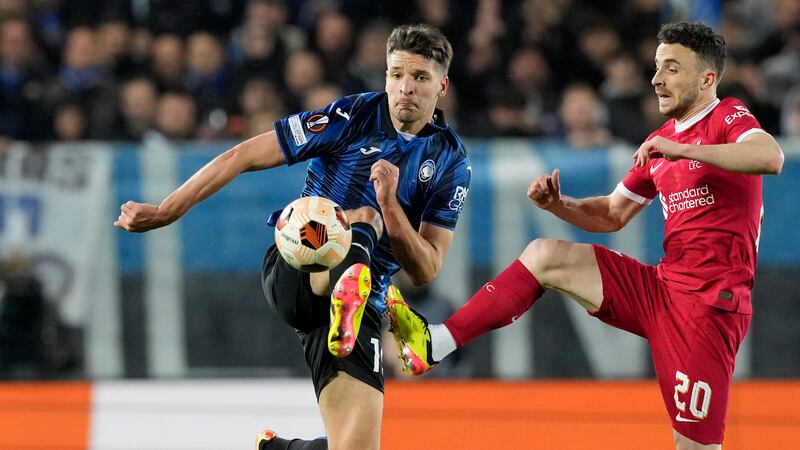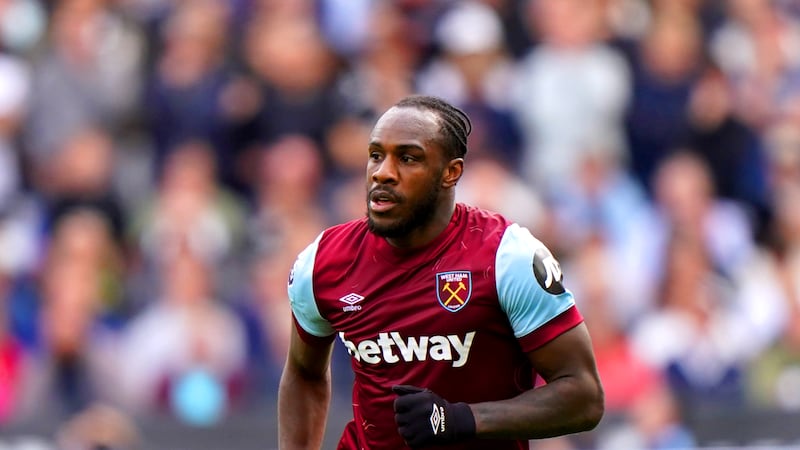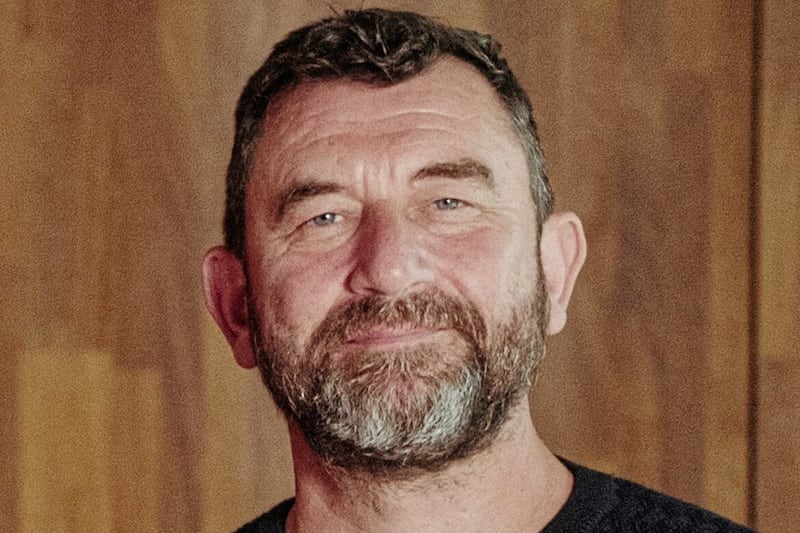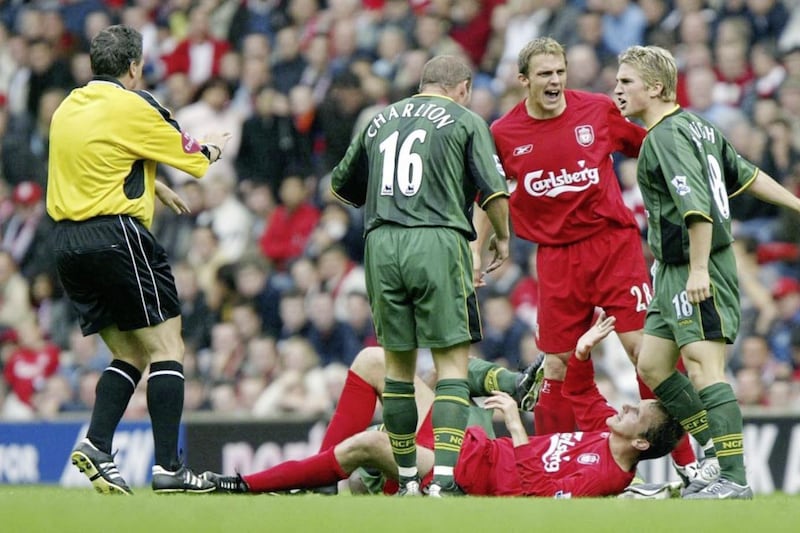IT was an agricultural hoof up the field from left-back Adam Drury that turned defence into attack, with danger still present even after Gary Doherty’s shot had spun off Roy Keane towards the corner of the box.
Paul McVeigh was on it quick as a flash, cutting inside John O’Shea with his right before shooting with his left.
Tim Howard got two hands on the ball but somehow it still squeezed inside his near post. The American goalkeeper should have done better - the sight of Keane thumping the turf with both fists, Sammy Kuffour-style, told you that - but McVeigh didn’t care.
He reeled away beaming, arms aloft. Delia led the celebrations in the stand. Taoiseach Bertie Ahern, sitting a few rows back, wore the look of a man with more on his mind than a possible Norwich comeback against his beloved Red Devils.
This was August 2004 and, although the Canaries still lost 2-1, McVeigh had reached a level he once thought unlikely. if not impossible.
Playing in the Premier League meant playing against the best in the world. Playing in front of huge crowds at the best stadiums, like Old Trafford.
It also meant Premier League wages. If that sounds crude, well, so be it.
This was the deal McVeigh struck with himself at the very beginning of a personal path towards enlightenment, and a career that would bring 274 appearances - most of which came in England’s top two divisions – as well as 20 caps for Northern Ireland.
Fifteen years since silencing the Theatre of Dreams, goal-setting remains more important than goal-getting ever was.
This is why, having returned home last April after 25 years across the water, McVeigh could be spotted up the hill in Hannahstown, running laps and doing extra sessions in the hope of helping Lamh Dhearg’s Antrim championship charge.
It’s also why he turned his back on the kind of cosy post-career career most retired footballers would give their right peg for, having been a much sought-after pundit around work as a sports psychologist at Crystal Palace.
Instead of sticking with the status quo, he traded it all - the comfort of the Sky Sports and Match of the Day studios, the relative security of a day job in the Premier League - for a crack at a world where cynicism and the potential for public humiliation come with the territory.
Logic told him he had already beaten the odds once... why couldn’t he do it again?
***************
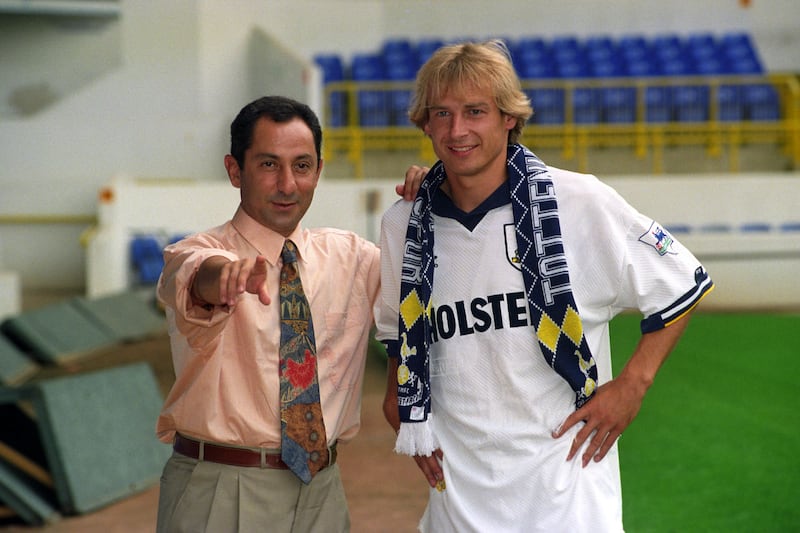
ON the face of it, the summer of 1994 was a decent time to be joining Spurs. The previous season they had finished in the bottom half of the table, expectations were high but not too high, and the club had a reputation for giving youth a chance.
All of these factors played into Paul McVeigh’s thinking when he swapped Andersonstown for London town after eye-catching performances with the famed St Oliver Plunkett club.
On his first day, however, came a swift indication of the size of the task ahead.
Arriving at the old Mill Hill training ground, the 16-year-old noticed television vans gathering in the car park. At pitchside, hordes of cameramen readied their gear.
It felt like the big time but, as he would soon discover, they weren’t there for him or his teenage team-mates.
“The World Cup was only over a few weeks, and after that Spurs had signed Jurgen Klinsmann. He was there to be unveiled to the press but, because the first team weren’t back training yet, the youth team had to go in and train with him.
“You’re standing there looking at a guy who’s already a World Cup winner, a star for Germany, and you’re straight away thinking ‘how am I ever going to get to that level?’
“That mindset of ‘I don’t know if I’m going to be able to do this’ was there from the first day. A lot of people don’t overcome that.”
He could easily have been one of those who struggled to conquer that initial crisis of confidence.
But McVeigh’s approach - his career, his life – was set on a different path when he started to flick through a borrowed copy of Awaken the Giant Within by American self-help guru Tony Robbins.
Sceptics might dismiss its contents out of hand but, to McVeigh, it all made perfect sense.
On the training pitch, everywhere the 5”6 Belfast boy looked he saw bigger men. Better athletes. Better footballers. Watching them fed those early doubts until belief grew that it was right there, in his head, where he could find what he needed to not only survive, but to thrive.
“I was completely unaware of the world of psychology, mental performance, until I read that book.
“I was looking for an edge. If we were all doing the same training on the pitch, that wasn’t going to give me an edge. If we were doing the same running sessions or weight sessions in the gym, that wasn’t going to give me an edge.
“As you can see, I’m not exactly Yaya Toure; I’m not the best athlete you’ve ever seen. In terms of physical attributes, I was bang average, middle of the road. Technically I was okay, nowhere near the best player on the team by a long stretch.
“Eventually I came to the conclusion that the best thing I could ever work on was my mindset, my psychology, because I believed that would determine where I was going to end up.
“Part of that is the goals you set - where you would like to see yourself in five or 10 years’ time. Setting goals on the kind of money you wanted to earn in football.
“Instead of just letting that happen by chance, if you’re more focused and put all your time and energy into that, there’s more chance you’re going to end up where you want to be.”
Inspired, the 18-year-old McVeigh went a step further and sought out a sports psychologist – in the absence of one at the club - and soon began making the four hour round trip from his north London home to Roehampton University for regular sessions.
“It wasn’t because my world had started to fall apart,” he adds, “I just felt it was worth trying.
“Eventually I got over my belief that I wasn’t good enough, and there were moments along the way that helped change that. For example, I was playing with a guy called Rory Allen in our youth team.
“Now, he got into the reserves first, then the first team first, and his debut was at White Hart Lane against Manchester United, live on Sky Sports. I remember sitting watching in the stand, all of us buzzing because our mate was making his debut.
“He scored that day, and as soon as he scored, it was like a switch went off in my head: ‘If he can do that, so can I. He’s better than me, but he’s not that much better than me’.
“All of a sudden it seemed attainable.”
Within three months McVeigh had followed suit, making his own first team breakthrough.
And if he was ahead of the curve when it came to mental preparation, seeing the daily trials and tribulations of a senior team-mate forced McVeigh to consider the physical wellbeing that would be central to the long career he hoped to have.
“I was sitting in the physio room watching Gary Mabbutt, our club captain, for about 45 minutes getting strapped, tablets, injections, bandages – just to get him out to training.
“He was 35 or 36 and I was watching that thinking ‘that’s not very old, in the grand scheme of things’. I was having a conversation with my mum about it and she said ‘why don’t you try yoga?’”
Even for a mind open to new ideas, there was initial scepticism – “church hall, bunch of women... not really for me” – but eventually he followed his mother’s instinct and gave it a go.
It was a wise move.
“I got a video and started doing it every day before training; I’m 42 now and I’m still doing yoga most days.
“I don’t know if it’s a coincidence or I was just really lucky, but I left a professional football career injury-free. I only had one muscle injury the whole way through.”
Some of his team-mates, however, needed a little more convincing.
After departing White Hart Lane in 2000, it wasn’t until McVeigh became established in the Norwich first team that he felt comfortable carrying out his normal routine at the club rather than at home, far from prying eyes.
“The first day I brought my yoga mat in it was cut up into a million pieces,” he smiles.
“I went down to the shop, bought another one and brought it in. What do you think happened to that? Burnt to a crisp.
“So I went and bought another one. This time it somehow found its way out into the car park where they were doing donuts on it. I’m thinking’ there’s no way this bunch of neanderthals are going to beat me’.
“They were trying to be funny, trying to use it as banter, but also trying to put me down because I was doing something different. So I got another one.
“The next day I was starting to do my routine and people were coming in, pinging rolled up socks and bits of paper off my head. A while later, one person popped his head around the door and said ‘Macca, what are you doing in here anyway?’
“That was the start of it.”
And where club captain Craig Fleming was the first to express an interest, others would soon follow suit.
“It wasn’t long before four or five them ended up doing it with me every day. That’s an illustration of how change happens in an environment like that.”
Rejection, curiosity, acceptance; he knew the drill. He knows it even better now.
The curtain call came almost 10 years ago, but there was no period of mourning after a long career that had given him plenty.
Instead, the next stage, the next challenge was soon to begin, and it brought him right back to the bottom of the ladder.
***************
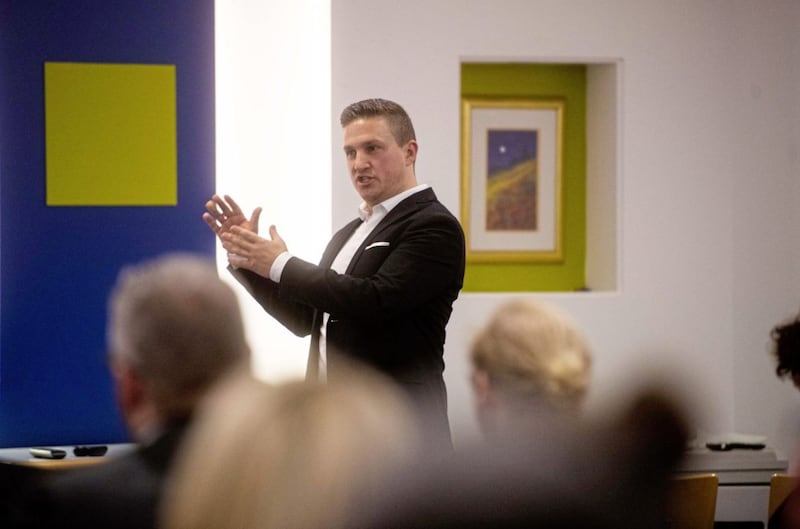
THERE’S an episode of The Office when David Brent is asked to be an ‘expert speaker’ at a training seminar (“300 bones – not bad for an hour’s work”).
He’d had his ear pierced ahead of the event and cards made up especially.
David Brent - assertiveness and guidance training in business. If it's in you, I'll find it
“I can also see if it's not in you,” he added by way of caveat, “I don't want to be sued because you haven't got it.”
After entering the room to Tina Turner’s Simply the Best, he orders anyone who doesn’t want to be there to leave.
It’s toe-curling stuff as Brent dies a little more with each misguided attempt to win them over, the final indignity coming when he is ushered out the door by a cleaning lady.
Paul McVeigh was acutely aware of the preconceptions and pitfalls when he chose to pursue a career in keynote speaking, and remembers suffering his share of car-crash moments during the early days.
“At the start, even though this was what I wanted to do because of the mental performance side of it, I hated public speaking. Apparently studies have shown that people are less afraid of snakes and death.
“Think about that; people would rather hold a python - or die! - than get up and speak in front of people. But it’s not the physical death people are afraid of, it’s the social death.
“There was one time I stood in front of an audience of 25 people and completely forgot what I was supposed to say. In that moment your whole world is falling in on you.
“I walked off stage, I was obviously really embarrassed but, later on that day, you realise nobody died. If you start applying my world of football to an experience like that, it’s a bad game.”
And so, like the yoga mat incident, he dusted himself down and came back for more.
Over time, the bad days drifted into the distance as confidence grew. Nine years after that first nerve-shredding experience, McVeigh is now a man in demand from the business world and beyond.
“The whole spectrum of being terrible at it to doing it for a living now, it’s like a child learning to walk. Stand up, fall down, stand up, fall down. Eventually you start to fall down a bit less.
“There’s all kinds of other sportspeople out there doing this but very few footballers, so there was a gap in the market. I’m pretty much taking 20-odd years of competing and being involved in what I would consider the most ruthless industry in the world.
“There’s got to be something in that.”
Typically, new targets have been set. Having spoken in 16 countries across three continents during the past two years, he wants to make that 50 across four continents by 2022.
Yet not all Paul McVeigh’s goals nowadays are on a global scale, and sometimes the ones closest to home can be the toughest to crack.
That doesn’t stop him trying, and the competitor in him couldn’t resist one last shot at an incredible sporting swansong in recent months.
“John Finucane said to me about coming up to Lamh Dhearg and giving it a go. I was like ‘I think I’m a bit old for that – I think we are a bit old for that!” he laughs.
“I’d played up until 16, nothing since, but after coming back to Belfast I wanted to get involved, and my goal was to play one minute of senior football – just one...”
It would be the perfect end to a near perfect story if McVeigh had realised that ambition. But in sport, and especially when there is a county championship at stake, there is no room for sentiment.
He wouldn’t have it any other way.
“I was trying my best, training so hard, doing more sessions, more weights than I’ve done in probably 10 years, and still couldn’t get anywhere near the likes of Ben Rice, Deccy Dunne, Conor Murray, all these guys.
“Even in terms of psychology, GAA players are another level up from soccer, in my experience. In terms of the resilience, the ability to deal with setbacks, the focus... I’ve played with players for 20 years who wouldn’t put in the same time commitment and effort those boys are, and that’s all down to their mindset
“I loved being involved, even if my performance level was nowhere near good enough to get into the senior team. I was there three or four nights a week, every week for maybe four months... it was the best thing.”
When he wasn’t pulling on the red and white for the reserves, McVeigh was there at senior training, doing what he could; the man who once shared a pitch with Cristiano Ronaldo retrieving ball after ball behind the goal on freezing cold nights up the hill.
For the epic county final clashes with Cargin he was pacing the line in a Maor Uisce bib, roaring his team-mates on every step of the way. It didn’t happen for them this time, but they’ll be back.
Where there’s a will, there’s a way; from Carrow Road to Corrigan Park and everywhere in between, the evidence is right there in front of them.
